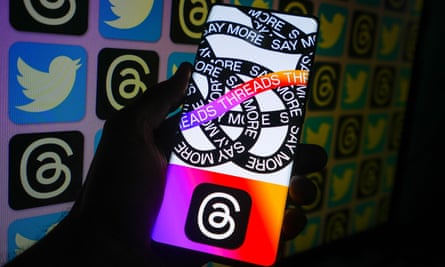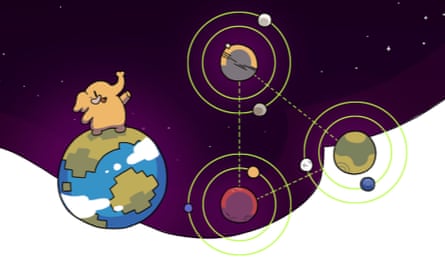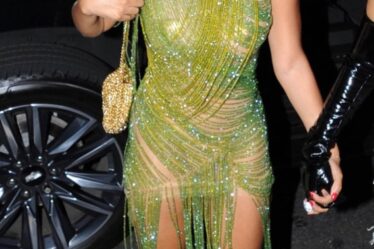
If Threads truly is a Twitter-killer then it claims it is going to do it with “kindness”. Mark Zuckerberg, whose company Meta launched the rival platform this week, put forward the idea that positivity would be a big difference for a product that looks remarkably similar to its rival.
“We are definitely focusing on kindness and making this a friendly place,” he wrote on his Threads account.
He added that Twitter had underachieved because it failed to stay positive and that being “friendly” would be key to the success of the new service, although one amicable exchange between the Meta chief and a mixed martial arts professional on Thursday served as a reminder to users that Zuckerberg recently accepted Elon Musk’s offer of a cage fight.
Turning negative into positive
The focus on positivity, from a company well used to content controversies of its own, is a telling indication of how the tech industry views Twitter’s performance under Musk’s ownership. Twitter is threatening to sue Meta over what it has described as a “copycat app” but if there is one thing Zuckerberg is keen to avoid replicating, it’s the negativity stalking that platform.
When Musk took over Twitter in a $44bn (£38bn) deal last October, the self-described “free speech absolutist” destabilised the company’s public image in two key ways: by making a series of changes, such as swingeing job cuts and imposing viewing limits, that created damaging headlines while also appearing to affect the platform’s performance; and antagonising its liberal user base by reinstating the accounts of controversial figures such as the misogynist influencer Andrew Tate, alongside acts such as unilaterally banning journalists before rowing back and reinstating them.
Rebecca McGrath, a technology analyst for the market research firm Mintel, says app users are historically reluctant to change their platform choices entirely, which in normal circumstances would not bode well for Threads. However, she says Musk has created “a unique opportunity” for Zuckerberg by unleashing a wave of controversy and platform changes since the takeover.
“Once a platform becomes part of our lives, we don’t really move away from it. But this is a unique situation where Twitter has become so controversial it has opened up a gap in the market that did not exist before.”
However, there is potential for a storm over Threads too, with concerns raised about its links to Instagram, which has been criticised by internet safety campaigners such as the Molly Rose Foundation over content that is harmful to children.
‘The network effect’
Threads now needs to capitalise on Twitter’s weakness by ensuring that it becomes a Twitter-like platform for splashy announcements and news, McGrath adds, mainstays of the public conversation that Zuckerberg is seeking to host.
“There is a range of people on Twitter who use it as their first port of call to communicate with the public – such as commentators, journalists, influencers, politicians. So it is very important that Threads gets these high-profile users and content creators using it.” Achieve that and users will follow, says McGrath.
Threads is linked to Meta’s Instagram platform and gives new users, who need an Instagram account to log on, the opportunity to kickstart their personal social network on Threads by populating their account with Threads users who they already follow on Instagram.
It is an example, says the tech analyst Benedict Evans, of how to “cold start an empty network”. He adds: “The crucial thing is the network effect. Whatever you want to talk about or read about, Twitter is the place for public conversations. And you can’t just move to a new empty network, because there’s no one else there.”
Instagram has more than 2 billion users, which helps explain how Threads has exceeded 30m sign-ups in less than 24 hours since its launch. “Threads is designed to go viral by embedding your Instagram followers into the app,” says Mike Proulx, a research director at the analysis firm Forrester.
Musk says under his ownership Twitter has grown users, to more than 250 million, and hate speech and misinformation have been tackled – although there are studies that have a different perspective on post-takeover moderation standards.
The battle for ad revenue
Those concerns about the platform becoming an overly toxic environment have struck at the revenue stream at the heart of Twitter’s business model: advertising. In 2021 Twitter reported that advertising accounted for 90% of the company’s $5.1bn in annual revenue.
After the takeover, concerns over moderation standards and a botched relaunch of Twitter’s subscription product led to advertisers either pausing spending or reducing it sharply. In March Musk said he expected annual revenue to come in at $3bn this year, indicating a heavy decline in ad spending.
Destruction of Twitter’s advertising base is an existential threat for a historically loss-making company that, post-takeover, must service a $13bn debt burden at a cost of $300m per quarter. If Zuckerberg’s kindness could kill, then so could a lack of advertiser cash. It prompted Musk to warn soon after the takeover that bankruptcy was a possibility, although he said recently the company had a chance of going cashflow positive (and thus generating some money to help service those debts).
The arrival of Threads adds to that pressure, and threatens to compound some of Musk’s missteps, by offering an alternative platform for advertisers. They must wait, though, after the Instagram boss, Adam Mosseri, said Meta wanted to get the platform right before launching advertising on it. Referring to putting ads on the platform, he told the tech news site The Verge: “Honestly, we’re not focused on it at all right now.”
Advertising experts say this at least gives Twitter some breathing space. “In the long run Threads is a threat because of the scale of Instagram and the amount of discipline and rigour that Zuckerberg will bring that Musk does not,” says Lou Paskalis, the chief executive of the advertising consultancy AJL Advisory.
But Twitter’s new chief executive, the highly rated advertising boss Linda Yaccarino – “the most trusted person in advertising” according to Paskalis – will have time to restore trust in the platform while Threads stays away from adverts for now.
Paskalis adds that the audience on Instagram is different, being less focused on Twitter’s basic staples such as breaking news. Mosseri said to users on Threads this week that the app was about “what public conversations you want to have” and if you did not want to engage in digital “back and forth” then you were probably better off posting on Instagram.
“The audience [on Instagram] is massive in scale but it’s not the same kind of community,” says Paskalis. This will also buy time for Twitter. But he adds: “The minute Threads starts taking advertising, we will see if it’s a mortal threat to Twitter.”
Other rival platforms

The emergence of Threads means that the other threats to Twitter, the decentralised competitors such as Mastodon and BlueSky, are less of an issue for Musk. Mastodon has about 13 million users while BlueSky, backed by the Twitter co-founder Jack Dorsey, is an invite-only app that had to pause sign-ups at one point last weekend after Musk’s decision to impose tweet-viewing limits created a flurry of interest.
But neither are at the scale of Threads, let alone Twitter, plus the decentralised model – Mastodon is made up of thousands of “instances” that host different communities – can be confusing for users, although Threads has pledged to adopt the same technology as Mastodon so you could theoretically take your Threads content elsewhere.
Threads, backed by Meta’s knowhow, and infrastructure, is the first serious threat to Twitter since it was bought by Musk. Underneath the kindness is, as ever, Zuckerberg’s competitive aggression.



